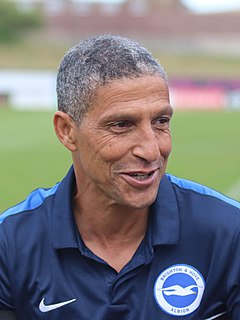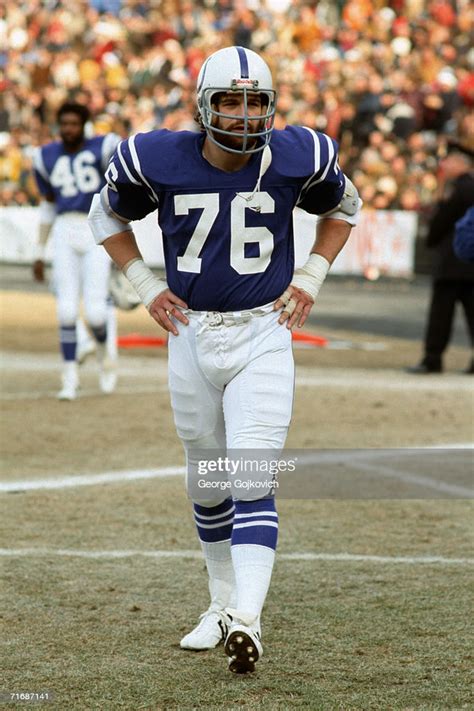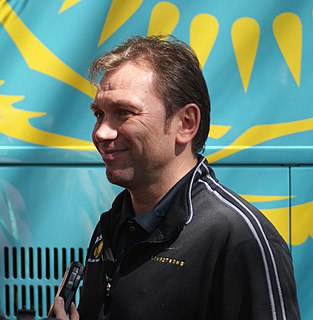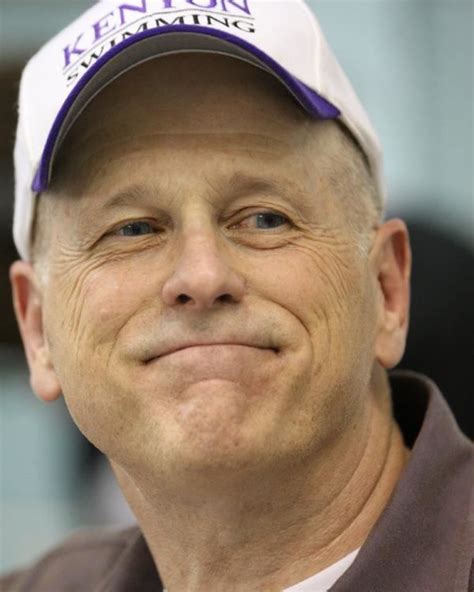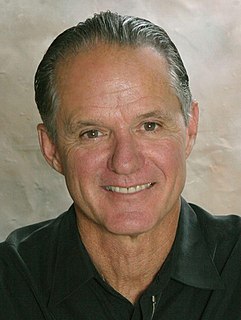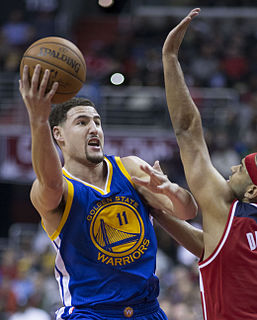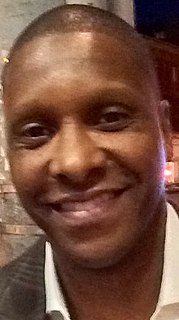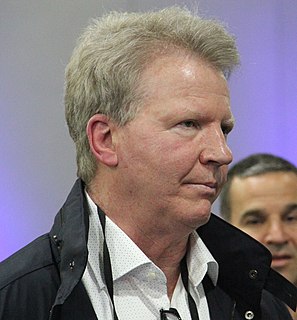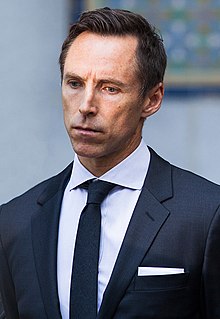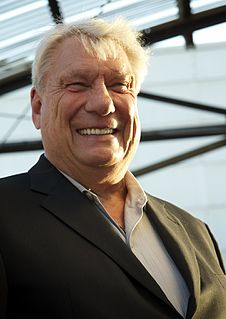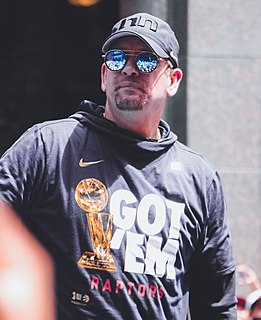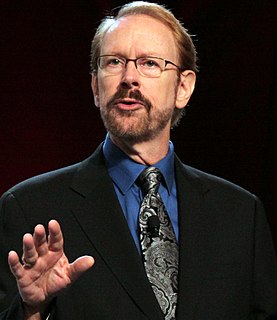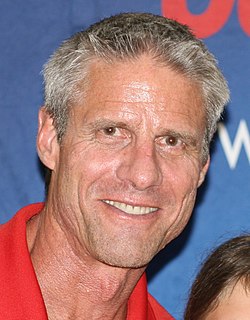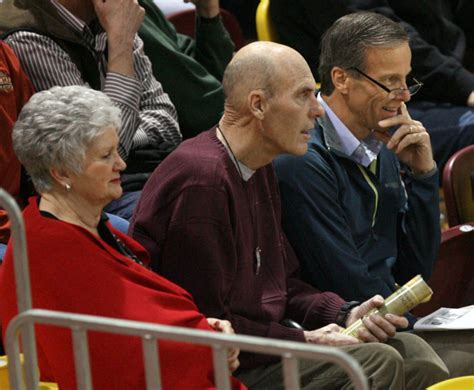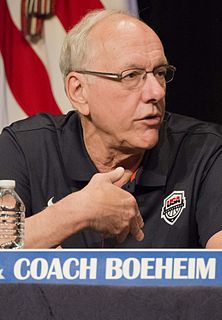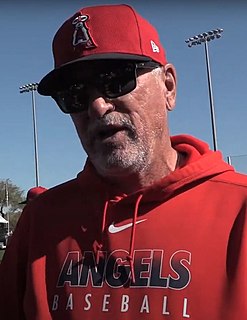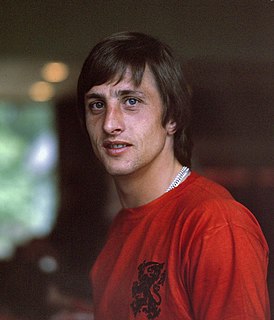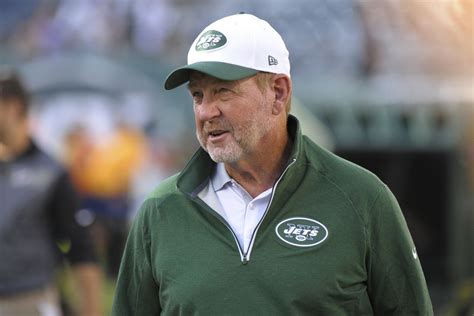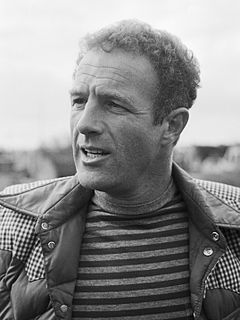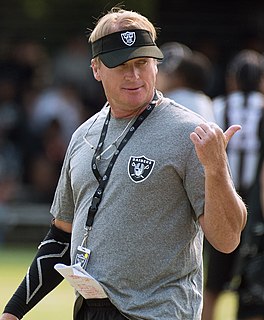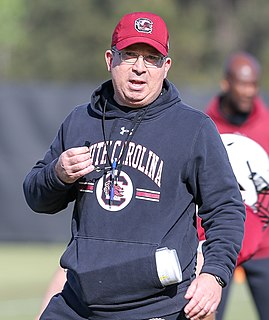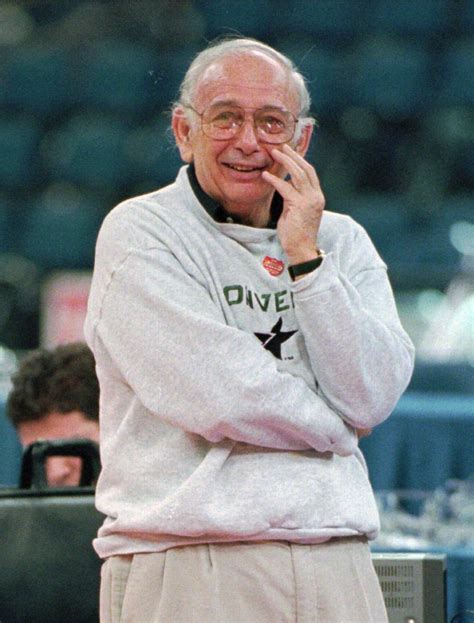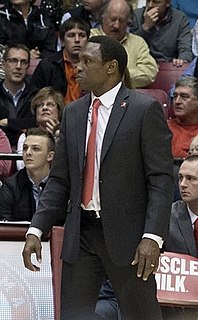Top 1009 Coaching Quotes & Sayings - Page 17
Explore popular Coaching quotes.
Last updated on April 17, 2025.
Ossie Ardiles got the job at Tottenham. I knew Ossie well and he brought me back as his reserve-team coach. That was my intro into coaching. Over the years I have known lots of other potential coaches who couldn't see a pathway. They couldn't see role models. There were so many BAME coaches who would apply for jobs and not even get an interview.
One of the great myths in America is that sports build character. They can and they should. Indeed, sports may be the perfect venue in which to build character. But sports don't build character unless a coach possesses character and intentionally teaches it. Sports can team with ethics and character and spirituality; virtuous coaching can integrate the body with the heart, the mind, and the soul.
I’ve always had this idea that if you’re going to try something, if you’re going to expend that first big block of effort and energy to participate - whether it’s riding the Tour de France or applying for a new job or coaching your daughter’s soccer team - you might as well go ahead and give whatever else it takes to win, I mean, I’m going to be there no matter what, right? Why not go ahead and get the victory?
My final coaching point of the day: It's my contention that in any given moment one lives one's life in one of two ways, either under a threat or for a challenge. In performing when it counts, it's one or the other, under a threat or for a challenge. If, as Einstein says, "Imagination will take you everywhere," then living your life under a threat will take you nowhere.
As the field of coaching finds its way to becoming a mature discipline, James Flaherty's dedicated field research, study, and sound articulation offers a definitive ground and a sensibility of genuine care. At the core this book offers a way of thinking about human beings that makes action and practice central to learning. This is a no-nonsense, generous, pragmatic book that belongs on the shelf every coach, novice or veteran.
I'm a guy who is just trying to be successful in whatever I do, and I give everything to my teammates, give everything to the coaching staff. When you fall short, it hurts and it eats at you, and it hurts me to know that I wish I could have done better and done more and just put a little bit more effort or whatever the case may be to help us get over the hump. But it just wasn't our time.
Steve held us to a high standard. He told us he was going to when we first met him at the USA camp. He's been a great leader. I mean, the guy always keeps his composure. He has an amazing mind for the game, and man, Steve, I'm just proud of him. The way he's balanced everybody and let us know what our roles are, he's been great for us. Him and the whole coaching staff. We all deserve this together, we work so hard.
I was working as hard as a human being could work. That tempo hasn't changed. I just have more diversity and more companies, and now I've got 33 companies so my dance card is full. Four kids and three grandkids, but I love that passionate lifestyle. I love constantly growing, I love seeing and feeling that you can have an impact. And gradually it went from just coaching to actually running businesses because I've had experiences that were life changing.
My father was a very fun dad; he was always coaching our soccer sports teams, he made sure that we had activities to do. He was kind of goofy and fun. But at the same time, he had a lot of lessons to teach us so that we didn't grow up and just not be good people. I try and reflect a lot on how I was raised by my father in the character that I'm playing now in being a dad. You've got to be strong for these kids. You also have to be fun and teach them all the lessons, not just one, or two, or three.
In 2005, a man diagnosed with multiple myeloma asked me if he would be alive to watch his daughter graduate from high school in a few months. In 2009, bound to a wheelchair, he watched his daughter graduate from college. The wheelchair had nothing to do with his cancer. The man had fallen down while coaching his youngest son's baseball team.
We have to move the meter in sports in Africa, especially basketball. With the growth of the NBA globally, we have to figure out more ways to develop facilities, coaching, leagues, and youth development in Africa. The talent is incredible. Especially physically. How do we get the youth to start playing at an early age just like in soccer? The future is bright. We now have an NBA office in Africa, we have legends and Hall of Famers, we have African assistant coaches, front office members, and some prominent African players over the last 10 years. So we must plan well for the next 10.
You have the management team, coaching staff, film staff, analytics team, training staff and playing team, and you're trying to manage all that and it's overwhelming. And then you have the media responsibilities. I don't know that I help at all, but I would think my value would be to help provide more of a clear-headed view from the outside. It's not like I have huge opinions, but I do have my point of view and perspective.
We all have direct experience with things that do or don't make us happy, we all have friends, therapists, cabdrivers, and talk-show hosts who tell us about things that will or won't make us happy, and yet, despite all this practice and all this coaching, our search for happiness often culminates in a stinky mess. We expect the next car, the next house, or the next promotion to make us happy even though the last ones didn't and even though others keep telling us that the next ones won't.
My dad took me to a high school basketball game and this very, very famous coach in Michigan, by the name of Lofton Greene - he was a guy that my dad was familiar with. He was from our hometown. And I watched the game and I said I didn't see this guy doing a lot of coaching. And my dad told me, well, it's just like a teacher - which he was - he said if you do a good job teaching during the week, when they take the test on Friday, that's not the time you have to do a lot of demonstrative things.
The Energy job was probably the key. It kind of transitioned me back into the States. It gave me a link to the NBA. And I got to make some contacts and meet some players and get players set up and learn the NBA game and terminology and coaching those type of players. It was certainly a huge, huge key to getting to the NBA.
I guess the prime example is in North America there's a thing where if there's no opportunity to move forward with the puck, then a [hockey] player is told to dump the puck into the other zone. Just give up the puck and dump it in. Give it to the other team. And to the Soviet mentality in coaching, it just doesn't make any sense. If you're a skilled player, why are you going to give the puck away to the other team? Just give it away, right?
The move from scarcity thinking to abundance thinking, from zero-sum competition to one-hundred-sum collaboration, is not just a “nice” or “moral” idea. In the twenty-first century, it's plain good sense. Scarcity says, “I'm going to keep all my ideas to myself and sell more than anyone else.” Abundance says, “By mentoring, coaching, and sharing all our best ideas, we're going to create a powerful tide that raises all our ships-and we'll all sell more as a result".
My general rule, which I have followed throughout my coaching career, is that everyone doesn't necessarily get treated the same way, because I'm not sure that's possible. But everyone has to be treated fairly. Moreover, they have to know and trust that they will be treated fairly. Dennis Green, NFL Coach There's nothing worse than the feeling of wishing you had another chance at a play because you weren't ready. Every athlete has those feelings to mull over, and over, and over... Don't even expose yourself to the possibility of being caught off-guard.
When you coach and teach leadership, most people think about them. It's like you're the leader and how do you influence them. Clearly, leaders do take their followers, their flock, their enterprise, their business - whatever - hopefully to a better place. But I think the foundation of what makes really great leaders is they lead themselves, and they're conscious about knowing themselves and coaching and leading themselves in a very profound way. The simplest of us talk to ourselves. The question is, "Do we really lead ourselves?"
The common belief that coaches must be abusive to be successful is a myth. Research shows that if you find a task fun, you'll perform better. If more coaches took . . . a Golden Rule approach to coaching, treating their players the way they themselves would like to be treated, fewer athletes would drop out of sports in their teens, and more athletes at every level would be happier and more satisfied.
Coaching staff: I know there's days you look at that film and you want to kill me. I'm not playing defense, taking bad shots, getting too many techs. But you always believe that I can be the guy. Through the tough times, you guys never left my side... That's something that I really appreciate and I never want to take you guys for granted. I thank you so much for being part of my life. And not just on the basketball court, but giving me talks about growing as a man first, and a basketball player next.
I love teaching I think more than anything. It's the opportunity to just teach young people and teach the game. You teach more than basketball. You teach life skills. The teaching part of it is something that I am passionate about. I look forward to every practice. A lot of people say well, I enjoy coaching, but I see myself as more as a teacher.
It is those who are successful, in other words, who are most likely to be given the kinds of special opportunities that lead to further success. It’s the rich who get the biggest tax breaks. It’s the best students who get the best teaching and most attention. And it’s the biggest nine- and ten-year-olds who get the most coaching and practice. Success is the result of what sociologists like to call “accumulative advantage.
I’m definitely excited to have a fresh start. Talking to the coach [Bob Hartley], talking to management, they want me to have success, and that definitely makes your life easier. It keeps your mind free to just go out there and play as good as you can, instead of worrying about giving up bad goals and having to prove yourself every night – not just to the public, but to the coaching staff and everybody else. That’s definitely a nicer way to feel comfortable, if you know they have your back.
No matter how you total success in the coaching profession it all comes down to a single factor - talent. There may be a hundred great coaches of whom you have never heard in basketball, football, or any sport who will probably never receive the acclaim they deserve simply because they have not been blessed with the talent. Although not every coach can win consistently with talent, no coach can win without it.
It's hard for these athletes to stay healthy. They are constantly being bombarded with unhealthy advertising. Peer pressure can override the body's demand for health. Being healthy goes beyond 'not being sick' (where all lab reports indicate health), to feeling optimistic, energetic, strong and happy with their bodies. Teaching them to take charge of their bodies is a job of coaching. Help them gain discipline in conditioning, nutrition and attitude/emotional control.
As a receiver, you want to run through contact. That's the biggest coaching point that most coaches give them. You're going to get grabbed and you're going to get into adverse situations. But if you run through contact and do not confuse the quarterback, more than likely you're going to get the football.
It's one of those things that it's everything you think it is, but then again you have to - you need time to really process the entire situation. You stand out on that platform afterwards and you're looking at the ballpark and the fans and the W flags everywhere, and truthfully I do think about everybody, I think about the fans and their parents and their grandparents and great-grandparents and everything that's been going on here for a while. So you think that - I think about my coaching staff.
In 1948, I began coaching basketball at UCLA. Each hour of practice we worked very hard. Each day we worked very hard. Each week we worked very hard. Each season we worked very hard. Four fourteen years we worked very hard and didn't win a national championship. However, a national championship was won in the fifteenth year. Another in the sixteenth. And eight more in the following ten years.
One day I was complaining to Bill Coltrin about what I thought was an unfair article about our team. I was going to call the writer and complain to him. Bill told me, "If you plan to stay in this business (coaching), you need to realize a couple of things about the press. One, whatever is written, it will probably be forgotten in two or three days by the public; and two, if you complain or make an enemy of the writer, just remember you may have your 'day in the sun,' but he/she is going to press 365 days a year." I have never forgotten that.
I love coaching football, and winning a Super Bowl was a goal I've had for a long time. But it has never been my purpose in life. My purpose in life is simply to glorify God. We have to be careful that we don't let the pursuit of our life's goals, no matter how important they seem, cause us to lose sight of our purpose. I coach football. But the good I can do to glorify God along the way is my real purpose.
There are no utopia jobs on this earth, .. There's nobody out there that can say, 'I've got the ideal job and there are no problems.' If your self worth is based on what other people think of you, you're in trouble. My self worth is not based on them. My self worth is based on my faith, how I treat others, what I'm doing right for this program and these kids and this coaching staff. Other than that, I understand you're not going to please everybody.
I think basketball has changed tremendously and for the better. I think that obviously the game is better. I think the skill of the players are better, the strength, the overall athleticism, the teamwork involved. I think coaching is better. We have more exposure for our game than ever. You know, our sport has grown significantly in really the last five years. It's pretty amazing.
I had great, great times as a Little League coach. People were talking about me quitting acting, and they would say, What about your creative juices? Coaching is creative, because you could take a kid who thought he wasn't any good and, within four minutes, change his mind. And I didn't have to wait six months for them to put music to it.
I took a lot of pride, honestly, in hiring these young guys, that not only to become future head coaches, but I wanted young guys that could help me - guys that can coach, guys that could study, guys that loved it, that would do it for nothing. That's how I got into coaching with the 49ers when John McVay hired me.
My dad had a spell when he came out of coaching doing some work with underprivileged children on quite a rough council estate in Southampton to help the kids and take them out to places. I used to go along with him. I used to play football with them, mess about with them. I was only 13 or 14 and became good friends with them.
Almost everyone in heaven has someone on Earth they watch, a loved one, a friend or even a stranger who was once kind, who offered warm food or a bright smile when one of us had needed it. And when I wasn’t watching I could hear the others talking to those they loved on Earth: just as fruitlessly as me, I’m afraid. A one-sided card cajoling and coaching of the young, a one way loving and desiring of their mates, a single-sided card that could never get signed.
Sometimes I feel tomorrow is the last. Some days I feel like I can go for years. I think my goal is that I enjoy coaching. I don't think I want to stop working. I think my dad worked in steel work for almost 50 years. The minute you saw him stop working you could see him go apart. I don't want to do that.
We've got two semi-professional leagues; we've got many other leagues, more coaching opportunities for youngsters. You never had that when I was younger. You had to go and join in with the boys - that helped me as a player, but I think girls feel more confident playing with other girls of the same age.
I'm passionate about coaching and being able to mentor young men in a lot of different ways. I think it's good to be able to do what you love to do. It's been in me since the beginning. I was telling my college coach what to do and he trusted me. When I got into the NBA, I started having conversations with coaches. Coach Gregg Popp(avich) brought a lot out in me. Coach Don Nelson gave me an incredible opportunity to spend some time with him and he molded me but at the same time allowed me to be myself.
